Papers by Michael Magcamit
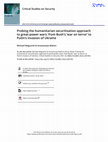
Critical Studies on Security, 2024
How do great-power leaders instrumentalise humanitarianism in sustaining the institutional and pu... more How do great-power leaders instrumentalise humanitarianism in sustaining the institutional and public mandate demanded by their war agendas? We examine the ‘humanitarian securitisation’ approach adopted by powerful state leaders as the domestic credibility and popularity of their war efforts become increasingly more difficult to guarantee over time. We define humanitarian securitisation as a discursive-hermeneutic process through which powerful initiator states frame the humanitarian crises arising from the terrorism and internal conflicts confronting less powerful target states as existential threats to the former’s own survival to bolster and justify their agendas further. Using Bush’s ‘war on terror’ and Putin’s Ukraine invasion as empirical cases, we argue that the humanitarian securitisation resulting from the artificial insertion of humanitarianism into the securitisation process becomes a double-edged sword that reinforces the legitimising and mobilising powers required by great-power leaders to pursue their narrow self-interests, but at the risk of being entangled into long drawn-out wars that damage genuine humanitarian efforts. In framing these ‘extraterritorial’ humanitarian crises as collective borderless existential threats that all parties affected must decisively defeat, this ad hoc and predatory process of humanitarian securitisation alters the form and substance of contemporary humanitarianism in a way that ultimately exacerbates existing power hierarchies.

International Affairs, 2024
To the surprise of many, populist leader Rodrigo Duterte instigated major shifts in Philippine fo... more To the surprise of many, populist leader Rodrigo Duterte instigated major shifts in Philippine foreign policy. His antagonism against the United States and European Union, fascination towards the revisionist Russia and China, and disdain for international law and institutions were viewed as significant departures from the nation's orthodox stances. Drawing on Moffitt and Tormey's conception of populism as a political style, and Buzan, Wæver and de Wilde's securitization theory, we develop and test the populist securitization framework in the context of Duterte's foreign policy-making. We argue that populist performances are securitizing acts comprised of distinctly populist performative repertoires used by political leaders to frame and execute an ‘anti-establishment’ foreign policy with sufficient level of audience consent. Using discursive interpretative analysis, we examine the impacts of Duterte's populist securitization of the liberal West as a threat to Philippine sovereignty. We find that while populist performances function as securitizing acts that can reorient established foreign policy positions and biases, such performances lead to uncertainty and erosion of credibility amid institutional fragmentation and domestic political distractions. Thus, the sustainability of populist performances on foreign policy depends on reconciling the tensions and overlaps between the populist leader's varying audiences and their mass constituencies.

Oxford University Press, 2022
Departing from the mainstream practice and conventional wisdom of materialist and rationalist acc... more Departing from the mainstream practice and conventional wisdom of materialist and rationalist accounts of internal and intrastate conflicts, the book demonstrates how and why emotions, symbolic predispositions, and perceptions are just as powerful and useful in understanding and explaining these phenomena. By uncovering the invisible albeit concrete emotive, symbolic, and perceptual causal mechanisms underpinning ethnoreligious otherings and the resulting violent protracted conflicts, the book aims to help address the incongruence between how the actual actors operating within these contexts think and act and the existing theories and models of how they are expected to behave. Accordingly, the book has three main goals. First, to highlight the centrality of emotions, symbolic predispositions, and perceptions in providing a more holistic and realistic understanding of otherings and conflicts. Second, to illustrate how the ethnoreligious othering framework developed and applied in the study bolsters and advances process tracing explanations by systematically incorporating context-specific intersubjective meanings into causal accounts of the events under investigation. And third, to emphasize the importance of recognizing religion and nationalism as legitimate constituents and instruments of contemporary realpolitik by underlining their enduring security utility and essence at individual, group, and state levels. As argued and established throughout the book, because the causal mechanisms driving ethnoreligious otherings and passionate conflicts are simultaneously emitting and are propelled by deeply entrenched emotions, symbolic predispositions, and perceptions, achieving durable peace settlement requires reconciliation initiatives and regulation strategies that directly and unapologetically incorporate and address these neglected “immaterial” and “irrational” forces.
International Relations of the Asia-Pacific, 2023
Since coming to power in 2016, the Democratic Progressive Party (DPP) has pledged to safeguard Ta... more Since coming to power in 2016, the Democratic Progressive Party (DPP) has pledged to safeguard Taiwan's sovereignty amidst Beijing's aggressive imposition of the one-China principle. This article assesses the impact of the DPP's recognition for survival strategy which involves using free trade agreements (FTAs) to boost Taiwan's legal standing and recognition in the international community. The strategy entails a two-pronged plan: retaining Taiwan's status as a vital regional economic player to ultimately advance its de jure sovereignty via regional FTAs. Drawing on Taiwan's past FTA experiences, we analyze the possible outcomes of the government's application to the Comprehensive and Progressive Agreement for Trans-Pacific Partnership (CPTPP) and the likely
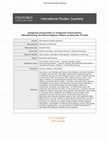
International Studies Quarterly, 2020
How does a once familiar and benign ethnoreligious community become a stranger and a threat? This... more How does a once familiar and benign ethnoreligious community become a stranger and a threat? This paper examines the underlying causal mechanisms driving rival ethnoreligious factions within pluralistic polities to frame each other as threats to their relative security, power, and status. Drawing on complementary theories from critical security, religious, and nationalism studies, I develop a framework that captures and explains the processes and dynamics through which threatening conceptions and narratives about the ethnoreligious others are constructed, socialized, and legitimized. To theoretically probe and empirically demonstrate the utility of this framework, I examine how the collective imagined insecurities among Muslim and Christian communities in Indonesia have crystallized into tangible security threats using interpretive process tracing method. Evidences produced by my theoretical and empirical analyses based on the novel qualitative data I gathered from my field research reveal that this chauvinistic, zero-sum phenomenon proceeds via a three-phase othering causal mechanism comprised of: cultivation of hostile emotive effects of ethnoreligious nationalism; securitization of othered ethnoreligious groups using hostile symbolic predispositions; and sacralization of hostile perceptions of indivisible ethnoreligious identities and homelands.

Michael Magcamit, 2019
In the contemporary Asia-Pacific context, the fault lines leading to the Thucydides trap can be a... more In the contemporary Asia-Pacific context, the fault lines leading to the Thucydides trap can be attributed to the continuing strategic competition between a seemingly declining United States and a rising China. Failure to circumvent this trap can ultimately result in a war of all against all. Against this backdrop, this article investigates how a small power re-evaluates its foreign policy and strategic behaviour using neoclassical realism theory. In particular, I examine President Rodrigo Duterte’s method which is characterized by four key elements: cultivating a more favourable image for China; moderating the country’s American-influenced strategic culture; mobilizing state-society relations supportive of ‘Sinicization’; and reorienting the country’s Western-based institutions to better accommodate Chinese pressures and incentives. Does a China-centric approach give a small power an indispensable strategic capital to successfully navigate and exploit both the challenges and opportunities of the impending new order? Do the Philippines’ shifting rules of engagement under the Duterte administration represent a forward-thinking strategic outlook rather than a defeatist and na ̈ıve stance? The article answers these questions by examining the factors and dynamics underpinning the conception and construction of the Duterte method, as well as its implications vis-a-vis a small power’s foreign policy and strategic behaviour.

International Politics, 2019
In the wake of North Korea's progressive missile testing that set even the usually stoic Japanese... more In the wake of North Korea's progressive missile testing that set even the usually stoic Japanese people into a panic mode, Japan has found itself at the mercy of its former enemies. In an ironic twist of fate, Tokyo's security outlooks seem to have become hostage to the strategic calculations of its fiercest nemesis in the past. This paper asks whether Prime Minister Shinzo Abe's desire for constitutional change is precipitated mainly by the resurgence of Japanese nationalist sentiments as what many of his critics claim, or if there are genuinely rational justifications for revising the country's 72-year old Constitution. And if so, why has it been so elusive for many Japanese leaders? Using neoclassical realism theory, I analyze the structural contexts and domestic intervening variables that simultaneously drive and prevent the realization of constitutional change in Japan. I argue that state leaders like Abe and those who have come before him have always been prone to acquiring flawed and inaccurate perceptions of the systemic stimuli; susceptible to making irrational and unsound decisions; and ineffective at mobilizing the national resources demanded by their preferred policies and strategies. Thus, despite having rational justifications, the quest for constitutional change has remained elusive for many Japanese leaders. Success will require Abe to carefully harmonize domestic and international expectations; prudently balance Japan's benign security intentions and hawkish military strategies; and shift away from his pragmatic-ambivalent style of domestic politics.
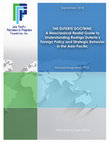
In his much-acclaimed historical account of the Peloponnesian War, Thucydides concluded that it w... more In his much-acclaimed historical account of the Peloponnesian War, Thucydides concluded that it was the rise of Athens and the fear that this event inspired in Sparta that made war inevitable. The probability of conflict ensuing between the emerging and established powers has been referred to by war scholars as the ‘Thucydides’ trap’. In the contemporary Asia-Pacific context, the fault lines leading to this trap can be attributed to the continuing strategic competition between a seemingly declining United States and a rising China. Failure to circumvent this trap can ultimately result in a ‘war of all against all, as the world tumultuously shifts from one superpower to another.’ Against this backdrop, this paper examines President Rodrigo Duterte’s foreign policy and strategic doctrine using a neoclassical realist model. The doctrine has four main elements: cultivating a more favorable image for China; moderating the country’s American-influenced strategic culture; mobilizing state-society relations supportive of ‘sinicization’; and overhauling the country’s Western-based institutions to better accommodate Chinese pressures and incentives. At this watershed moment in the history of international politics, does Duterte’s China-centric approach give the Philippines an indispensable strategic capital to successfully navigate and exploit both the challenges and opportunities of the impending new order? Do the president’s differing rules of engagement toward Beijing and Washington reveal a calculated and forward-thinking strategic outlook rather than a defeatist and naïve stance? The paper answers these questions by examining the factors and dynamics underpinning the creation and implementation of the Duterte doctrine.

World Affairs, 2018
In the age of growing global populism, the continued popularity and relevance of a populist gover... more In the age of growing global populism, the continued popularity and relevance of a populist government is anchored on the ability of its populist leader to convince the voters that the primary objective of his foreign policies is to secure the interests of the state and its citizens. However, without an adequate level of state power, pursuing realist foreign policies to improve the state’s relative gains and position in the international system can pose significant risks even for the most influen- tial populist leader. Hence, the question is, how do populist leaders acquire an adequate level of state power to implement realist foreign policies, without ulti- mately losing their political capital and institutional legitimacy in the process? To answer this question, I develop a model that illustrates the three-way linkage between populism, securitization, and realism. I use this model to explain the rationale behind President Donald Trump’s ‘America First’ doctrine, as well as its implications for U.S. foreign policy making. I argue that “populist securitization” is a conduit through which populist leaders formulate, execute, and justify their realist foreign policies. Using Trump’s securitization of the U.S. economy as a case study, I reveal how a populist securitization act can trigger the illiberal tendencies and nativist sentiments of the nationalistic voters, which, in turn, allow populist leaders to maintain their popularity and legitimacy among these voters while they experiment with realist foreign policies.

Journal of Asian Security and International Affairs , 2016
Our assumptions about the nature and conduct of contemporary international politics deeply impact... more Our assumptions about the nature and conduct of contemporary international politics deeply impact how we view maritime disputes plaguing the East and South China Seas. In this article, our analysis of the push and pull factors that influence the extent and possible resolution of maritime disputes in East Asia reveals that war is neither opposed in principle nor completely forbidden as an alternative. Amid heightening maritime tensions in the region, we argue that the underlying forces sustaining complex interdependence are what prevent rival states from engaging into a realist-inspired, zero-sum warfare. However, this is not to suggest that economic interdependence creates an absolute power that completely eradicates these flashpoints, and neither do we imply that it faithfully reflects East Asia's maritime political reality. Although East Asian countries (particularly the more powerful ones) may think that open war can be justified, as a matter of practical utility, avoiding it is likely to be more effective in achieving the goals of a given conflict.

Journal of Asian Security and International Affairs, 2015
This article examines Taiwan's cross-strait relations with China by analyzing the linkages betwee... more This article examines Taiwan's cross-strait relations with China by analyzing the linkages between their respective security interests and free trade objectives in the twenty-first century. It argues that these entanglements induce a scenario akin to the prisoner's dilemma that compels Taiwanese leaders and policymak-ers to preserve the Chinese-dominated cross-strait status quo. To enhance their political appeals during general elections, the major political parties in Taiwan are being forced to cooperate with each other, albeit artificially. By adopting a parallel , watered-down approach to sensitive political issues, particularly with respect to Taiwan's sovereignty status, the omnipresent China factor is being legitimized further. Such an approach homogenizes the parties' political agendas with respect to Taiwanese autonomy which leads to the island's perpetual entrapment within the One-China trajectory. Using original and secondary sources in the empirical analysis of the security–trade nexus mainly from the Taiwanese perspective, the article highlights the slow yet steady co-optation of Taiwan's sovereign interests within China's sinicization project.

Asian Affairs, 2015
Singapore’s rude awakening to independence has led to the creation of one of the most important a... more Singapore’s rude awakening to independence has led to the creation of one of the most important and strategic entrepôts in the Asia-Pacific. The country’s limited territorial lands and natural resources, combined with huge per capita income, high population density and sensitive racial mix, make Singapore the quintessential pragmatic trading state of the twenty-first century. This paper examines how Singapore has embedded itself at the centre of regional and global trade systems by exploiting various forms of free trade activities including multilateral, regional and bilateral FTAs that underpin its security and survival. It argues that in order to maintain the city-state’s geo-economic and geo-political viability, the Singaporean government has progressively
linked its security interests with its multilevel free trade activities. Given the ‘vulnerability fetish’ and siege mentality that confront Singaporean leaders and policymakers, the pursuit of economic development via free trade has become the heart of its national security policy and strategy. The paper concludes by arguing that the enhancement and preservation of Singapore’s survival as a sovereign nation-state demands a strategic utilization of FTAs with different trade partners, especially with regional and trans-regional powers such as the United States and China.

Asian Journal of Political Science, 2015
Singapore’s rude awakening to independence has led to the creation of one of the most important a... more Singapore’s rude awakening to independence has led to the creation of one of the most important and strategic entrepôts in the Asia-Pacific. The country’s limited territorial lands and natural resources, combined with huge per capita income, high population density and sensitive racial mix, make Singapore the quintessential pragmatic trading state of the twenty-first century. This paper examines how Singapore has embedded itself at the centre of regional and global trade systems by exploiting various forms of free trade activities including multilateral, regional and bilateral FTAs that underpin its security and survival. It argues that in order to maintain the city-state’s geoeconomic and geo-political viability, the Singaporean government has progressively
linked its security interests with its multilevel free trade activities. Given the ‘vulnerability fetish’ and siege mentality that confront Singaporean leaders and policymakers, the pursuit of economic development via free trade has become the heart of its national security policy and strategy. The paper concludes by arguing that the enhancement and preservation of Singapore’s survival as a sovereign nation-state demands a strategic utilization of FTAs with different trade partners, especially with regional and trans-regional powers such as the United States and China.

Japanese Journal of Political Science, 2016
This paper examines the manner through which the Philippine government has utilized free trade in... more This paper examines the manner through which the Philippine government has utilized free trade in pursuing its development-oriented national security policies and strategies in the twenty-first century. It argues that against the backdrop of uneven economic development being perpetuated by a deeply entrenched oligarchic system and patronage culture, the primary referent of Philippine national security is its diminishing development space. Despite the government rhetoric with regard to the role of inclusive development in enhancing national security, the Philippine political economy remains highly oligarchic and patrimonial. Such a condition has resulted in institutionalized inequality and structural poverty that undermine the country's supposedly development-based security model. The ability of the very few yet very powerful Filipino elites to transform the country into an oligarchipelago underscores the inefficiencies emanating from this type of politico-economic arrangement. In light of this, the paper evaluates the impacts of the Philippines' free trade activities on its overall level of development space by focusing on several crucial aspects of free trade that the government has failed to properly consider. Moreover, it scrutinizes the key factors that affect the utility of free trade for securing and enhancing the Philippines' development space. The paper concludes by arguing that the Philippine government's attempts at linking its development-centric security interests and free trade objectives have resulted not only in the preservation of uneven economic development and but also the further reinforcement of the existing oligarchic system and patronage culture in the country.

International Relations of the Asia-Pacific, 2015
This paper seeks to explore and explain the process through which Taiwan utilizes free trade – bo... more This paper seeks to explore and explain the process through which Taiwan utilizes free trade – both at multilateral and bilateral levels – in enhancing its shrinking de facto sovereignty against the backdrop of ubiquitous 'China factor' in the twenty-first century. It argues that China's sinicization project creates a scenario wherein increasing cross-strait stability ironically leads to decreasing de facto sovereignty for Taiwan. Due to this existing cross-strait security dilemma, Taiwanese leaders are being forced to preserve the island's quasi-independent statehood due to fears of losing its remaining de facto autonomy over domestic and foreign affairs. In essence, Taiwan chooses to be de facto free by remaining de jure unfree. Taiwan's sovereign space, therefore, becomes a pivotal referent object of its national security policy and strategy. Balancing between the two paradoxical interests of enhancing sovereignty while maintaining the Chinese-dominated cross-strait status-quo underlines the relentless games, changes, and fears that Taiwan confronts today.
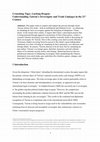
This paper seeks to explore and explain the process through which
Taiwan utilizes free trade – b... more This paper seeks to explore and explain the process through which
Taiwan utilizes free trade – both at multilateral and bilateral levels – in
enhancing its shrinking de facto sovereignty against the backdrop of ubiquitous ‘China factor’ in the twenty-first century. It argues that China’s sinicization project creates a scenario wherein increasing cross-strait stability ironically leads to decreasing de facto sovereignty for Taiwan. Due to this existing cross-strait security dilemma, Taiwanese leaders are being forced to preserve the island’s quasi-independent statehood over fears of
losing its remaining de facto autonomy over domestic and foreign affairs. In essence, Taiwan chooses to be de facto free by remaining de jure unfree. Taiwan’s sovereign space, therefore, becomes a pivotal referent. object of its national security policy and strategy. Balancing between the two paradoxical interests of enhancing sovereignty while maintaining the Chinese-dominated cross-strait status-quo underlines the relentless games, changes, and fears that Taiwan confront today.

Singapore’s rude awakening to independence has led to the creation of one of the most important a... more Singapore’s rude awakening to independence has led to the creation of one of the most important and strategic entrepôts in the Asia-Pacific. The country’s limited territorial lands and
natural resources, combined with huge per capita income, high population density and sensitive racial concoction, make Singapore the quintessential pragmatic trading state of the twenty-first century. This paper examines the dynamics with which Singapore has embedded itself at the centre of regional and global trade systems by exploiting various forms of free trade agreement including multilateral, regional and bilateral FTAs that underpin its security and survival. It
argues that in order to maintain the city-state’s geo-economic and geo-political viability, the Singaporean government has progressively linked its security interests with its multilevel free trade activities. Given the vulnerability fetish and siege mentality that confront Singaporean leaders and policymakers, the pursuit of economic development via free trade has become the heart of its national security policy and strategy. The paper concludes by arguing that the enhancement and preservation of Singapore’s survival as a sovereign nation-state demands a strategic utilization of FTAs with different trade partners, especially with inter-regional and transregional powers such as the United States and China.
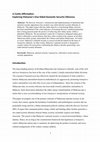
The Barisan Nasional’s construction and implementation of ideational and material security appara... more The Barisan Nasional’s construction and implementation of ideational and material security apparatuses has created a one-sided internal security dilemma in Malaysia. This paper argues that the noble objective of promoting Malay interests has been transformed to the venal objective of securing Barisan’s political perpetuity that is being pursued under the pretext of achieving inter-ethnic parity within a pluralistic Malaysia. The government’s quest for a bumiputra-imagined nation gave birth to affirmative action policies that have often worked at the expense of all other Malaysian ethnic groups, particularly the Chinese and Indian-Malaysians. For better or worse, Malaysia’s national security is conceived and developed on the basis of bumiputra ethnicity. In other words, Malaysia’s national security is designed to counter mainly the insecurities confronting the Malays, thereby generating a one-sided internal security dilemma.
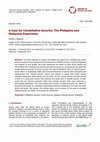
This article attempts to explore and analyse the evidence for cohabiting the human
security conc... more This article attempts to explore and analyse the evidence for cohabiting the human
security concept into the national security frameworks of ASEAN countries. Using the Philippines
and Malaysia as case studies, the article determines the extent to which public officials and
policymakers have redefined and reenvisioned national security by incorporating non-traditional,
people-centered elements of human security. The word 'cohabitation' refers to national governments'
efforts to amalgamate statist and humanist dimensions of security when articulating and
implementing their national security rhetoric and agenda. It argues that human security
naturally complements state security, and vice versa. As such, human security and state security
co-exist in a constructive manner that enhances the overall level of national security. In other
words, they are mutually constitutive rather than mutually corrosive. Both cases underscore a
two-pronged assumption. First, the meaning and provision of national security can neither be
eloquently articulated nor completely substantiated without considerations for 'below the state'
actors and issues. And second, the eminent status vis-à-vis power of the state in providing
national security can neither be trivialized nor undermined.

This article examines Taiwan’s cross-strait relations with China by analysing the linkages betwee... more This article examines Taiwan’s cross-strait relations with China by analysing the linkages between their respective security interests and free trade objectives in the twenty-first century. It argues that these entanglements induce a scenario akin to the prisoner’s dilemma that compels Taiwanese leaders and policymakers to preserve the Chinese-dominated cross-strait status quo. To enhance their political appeals during general elections, the major political parties in Taiwan are being forced to cooperate with each other, albeit artificially. By adopting a parallel, watered-down approach to sensitive political issues, particularly with respect to Taiwan’s sovereignty status, the omnipresent China factor is being legitimised further. Such approach homogenizes the parties’ political agendas with respect to Taiwanese autonomy which leads to the island’s perpetual entrapment within the One-China trajectory. Using original and secondary sources in the empirical analysis of the security-trade nexus mainly from the Taiwanese perspective, the article highlights the slow yet steady co-optation of Taiwan’s sovereign interests within China’s sinicization project.











Uploads
Papers by Michael Magcamit
linked its security interests with its multilevel free trade activities. Given the ‘vulnerability fetish’ and siege mentality that confront Singaporean leaders and policymakers, the pursuit of economic development via free trade has become the heart of its national security policy and strategy. The paper concludes by arguing that the enhancement and preservation of Singapore’s survival as a sovereign nation-state demands a strategic utilization of FTAs with different trade partners, especially with regional and trans-regional powers such as the United States and China.
linked its security interests with its multilevel free trade activities. Given the ‘vulnerability fetish’ and siege mentality that confront Singaporean leaders and policymakers, the pursuit of economic development via free trade has become the heart of its national security policy and strategy. The paper concludes by arguing that the enhancement and preservation of Singapore’s survival as a sovereign nation-state demands a strategic utilization of FTAs with different trade partners, especially with regional and trans-regional powers such as the United States and China.
Taiwan utilizes free trade – both at multilateral and bilateral levels – in
enhancing its shrinking de facto sovereignty against the backdrop of ubiquitous ‘China factor’ in the twenty-first century. It argues that China’s sinicization project creates a scenario wherein increasing cross-strait stability ironically leads to decreasing de facto sovereignty for Taiwan. Due to this existing cross-strait security dilemma, Taiwanese leaders are being forced to preserve the island’s quasi-independent statehood over fears of
losing its remaining de facto autonomy over domestic and foreign affairs. In essence, Taiwan chooses to be de facto free by remaining de jure unfree. Taiwan’s sovereign space, therefore, becomes a pivotal referent. object of its national security policy and strategy. Balancing between the two paradoxical interests of enhancing sovereignty while maintaining the Chinese-dominated cross-strait status-quo underlines the relentless games, changes, and fears that Taiwan confront today.
natural resources, combined with huge per capita income, high population density and sensitive racial concoction, make Singapore the quintessential pragmatic trading state of the twenty-first century. This paper examines the dynamics with which Singapore has embedded itself at the centre of regional and global trade systems by exploiting various forms of free trade agreement including multilateral, regional and bilateral FTAs that underpin its security and survival. It
argues that in order to maintain the city-state’s geo-economic and geo-political viability, the Singaporean government has progressively linked its security interests with its multilevel free trade activities. Given the vulnerability fetish and siege mentality that confront Singaporean leaders and policymakers, the pursuit of economic development via free trade has become the heart of its national security policy and strategy. The paper concludes by arguing that the enhancement and preservation of Singapore’s survival as a sovereign nation-state demands a strategic utilization of FTAs with different trade partners, especially with inter-regional and transregional powers such as the United States and China.
security concept into the national security frameworks of ASEAN countries. Using the Philippines
and Malaysia as case studies, the article determines the extent to which public officials and
policymakers have redefined and reenvisioned national security by incorporating non-traditional,
people-centered elements of human security. The word 'cohabitation' refers to national governments'
efforts to amalgamate statist and humanist dimensions of security when articulating and
implementing their national security rhetoric and agenda. It argues that human security
naturally complements state security, and vice versa. As such, human security and state security
co-exist in a constructive manner that enhances the overall level of national security. In other
words, they are mutually constitutive rather than mutually corrosive. Both cases underscore a
two-pronged assumption. First, the meaning and provision of national security can neither be
eloquently articulated nor completely substantiated without considerations for 'below the state'
actors and issues. And second, the eminent status vis-à-vis power of the state in providing
national security can neither be trivialized nor undermined.
linked its security interests with its multilevel free trade activities. Given the ‘vulnerability fetish’ and siege mentality that confront Singaporean leaders and policymakers, the pursuit of economic development via free trade has become the heart of its national security policy and strategy. The paper concludes by arguing that the enhancement and preservation of Singapore’s survival as a sovereign nation-state demands a strategic utilization of FTAs with different trade partners, especially with regional and trans-regional powers such as the United States and China.
linked its security interests with its multilevel free trade activities. Given the ‘vulnerability fetish’ and siege mentality that confront Singaporean leaders and policymakers, the pursuit of economic development via free trade has become the heart of its national security policy and strategy. The paper concludes by arguing that the enhancement and preservation of Singapore’s survival as a sovereign nation-state demands a strategic utilization of FTAs with different trade partners, especially with regional and trans-regional powers such as the United States and China.
Taiwan utilizes free trade – both at multilateral and bilateral levels – in
enhancing its shrinking de facto sovereignty against the backdrop of ubiquitous ‘China factor’ in the twenty-first century. It argues that China’s sinicization project creates a scenario wherein increasing cross-strait stability ironically leads to decreasing de facto sovereignty for Taiwan. Due to this existing cross-strait security dilemma, Taiwanese leaders are being forced to preserve the island’s quasi-independent statehood over fears of
losing its remaining de facto autonomy over domestic and foreign affairs. In essence, Taiwan chooses to be de facto free by remaining de jure unfree. Taiwan’s sovereign space, therefore, becomes a pivotal referent. object of its national security policy and strategy. Balancing between the two paradoxical interests of enhancing sovereignty while maintaining the Chinese-dominated cross-strait status-quo underlines the relentless games, changes, and fears that Taiwan confront today.
natural resources, combined with huge per capita income, high population density and sensitive racial concoction, make Singapore the quintessential pragmatic trading state of the twenty-first century. This paper examines the dynamics with which Singapore has embedded itself at the centre of regional and global trade systems by exploiting various forms of free trade agreement including multilateral, regional and bilateral FTAs that underpin its security and survival. It
argues that in order to maintain the city-state’s geo-economic and geo-political viability, the Singaporean government has progressively linked its security interests with its multilevel free trade activities. Given the vulnerability fetish and siege mentality that confront Singaporean leaders and policymakers, the pursuit of economic development via free trade has become the heart of its national security policy and strategy. The paper concludes by arguing that the enhancement and preservation of Singapore’s survival as a sovereign nation-state demands a strategic utilization of FTAs with different trade partners, especially with inter-regional and transregional powers such as the United States and China.
security concept into the national security frameworks of ASEAN countries. Using the Philippines
and Malaysia as case studies, the article determines the extent to which public officials and
policymakers have redefined and reenvisioned national security by incorporating non-traditional,
people-centered elements of human security. The word 'cohabitation' refers to national governments'
efforts to amalgamate statist and humanist dimensions of security when articulating and
implementing their national security rhetoric and agenda. It argues that human security
naturally complements state security, and vice versa. As such, human security and state security
co-exist in a constructive manner that enhances the overall level of national security. In other
words, they are mutually constitutive rather than mutually corrosive. Both cases underscore a
two-pronged assumption. First, the meaning and provision of national security can neither be
eloquently articulated nor completely substantiated without considerations for 'below the state'
actors and issues. And second, the eminent status vis-à-vis power of the state in providing
national security can neither be trivialized nor undermined.